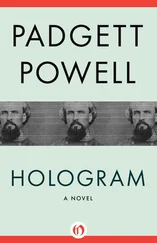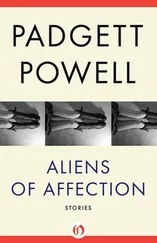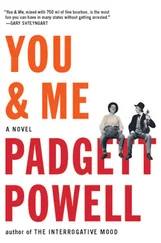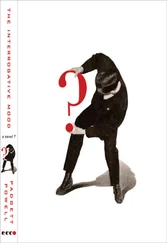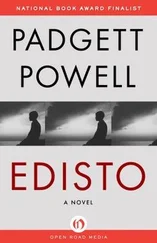This was of course suspiciously convenient — looking to Mrs. Hollingsworth, given her own ruminations concerning men who wanted and needed. But it was also complicated enough that she was not sure she had generated it all. It had an integrity that was stronger than her own formulation would have been, she thought.
She approached the man and put her finger inside the hopeless shirt she had cruelly given him. It seemed a fit emblem of this new life he said he had, though. Previously the shirt would have been a nice powder-blue Brooks Brothers oxford cloth. "What I want," she said, “is for you to take a bath with me.”
The lemon dog was working a spot on the living room carpet. It could not advance because it had to do the system-clearing cough at every sniff. It stood in its tracks, snuffling up and discarding invisible olfactory trash. “Too much weirdness in that carpet for him to know anything at all," the man said. “He’s got the instinct to give up. He’ll move on. I must too.” Mrs. Hollingsworth did not like her man speaking this overtly — she was better than that, she thought, and he was. Still, he said it. She was going to have to get used to the idea of taking a man for what he was despite her cartoon of him. She had heard of Michelangelo’s cartoon on the Sistine Chapel ceiling, cut into the plaster, lines that he had had the genius to ignore once up there on his back with the truer paintbrush in his hand.
* * *
In the scalding tub — the man shied from the water, and whimpered and fretted getting in, almost asymptotically, and remarked that he needed to be sterilized anyway — she laid the man back against her and held him in her arms. She calmed his eyes by pressing her hot hands over his eyelids, and she held his breasts, and her own were trapped against his back in an exhilarating press of steam and heat, making them tender and alive. She pushed the man forward and checked them to see if they had turned into huge wontons, which is what they felt like. His broad back was gorgeous in that position, and she took a good coarse washcloth and good glycerine soap to him. She washed him as if, it occurred to her, they were in the nineteenth century, or whatever century it was or centuries it was that people sat in tubs and other people poured great gouts of hot water on them and washed them. How had that disappeared? Maybe that disappearance was the beginning of the hell-in-a-handcart ride the human world seemed set on. The man leaned forward and accepted this succor from her without protest.
He began to speak. He spoke at great length, and nothing he said was intelligible to the ear. Yet she understood everything he said. It was a modification of the curious phenomenon that Ray Oswald had observed in the Forrest film during the dinner party. It was talk that sounded like talk but was not talk, yet in the present case was understandable to an organ other than the ear and the brain. While he talked, the lemon dog came into the bathroom and stopped its snuffling and sat and regarded the man with its head held atilt as if it understood everything. Mrs. Hollingsworth realized she was listening in the same way.
She realized too she was not capable of reporting what the man was saying, any more than the dog was. But the man was speaking the truth of his life, and to her. It was of the pain of his life, and his smallness, and his failures, and it was offered to her not as something she would need to assume the burden of and help him with, any more than the dog would be asked to help him with it. It was being put into the air more or less as clothes are put into the air before lovers unite. He was taking his clothes off for her. Hers, she felt, were off. She realized that in this respect she was not unlike the dog. This was perhaps what was spectacularly lovable about dogs: their clothes were off at all times, and they did not even know it. People wanted to be that way
She and the dog listened to the man go on. The room was filled with agreeable steam and the music of this confession that was so complicated, like the carpet the dog could not analyze, that you could only love it and go with it and hum along and kiss the ear of the man singing it, who was singing it not because he needed her to hear it but because he wanted her to hear it, and she did not want to hear it, but she needed to.
She began to see along with the man, to comprehend, as it were, because she could not apprehend what he was saying in the ramble of language that was not talk. The man was seeing that his father who had taken him out of football had also sold his shotgun rather than give it to him, a boy of thirteen who could have used a shotgun. So the disappointment the boy had given the father came before that. The mother was somehow approving of this, the not football and the not gun. The father was known to fight and the mother was also approving that the boy would not be known to fight, though she approved of the father’s violence. Had the father had the boy taken from him by the mother? What were the mothers nonfootball nongun nonviolent plans and hopes for her boy then? Plans so fond that she denied the plans the father had naturally had, in the absence of which the boy would grow up to be afraid of thick — shouldered high school boys because he had not been allowed to be one. And in the absence of which the boy would grow to look distrustfully upon the women who purported to give him succor — what were they really up to? Were they not like his mother? Did they have plans for you that were defined primarily by their not being someone else’s plans for you, that alone their virtue? Facing a woman who meant him well, the boy had become a man in a hollow of doubt. He had kissed his father at the funeral but not his mother. Because of his mother he had not assaulted the man in the funeral home who had insulted them. His father would have assaulted the man, in the parlor or on the very embalming table had the struggle improbably moved from one room to the next. Yet the man who had been the boy whose father would not give him a shotgun or let him play football or teach him to fight or even to gamble at cards could only bluster and threaten and walk out into the blinding sun and see a vision of Forrest riding a horse through sunny hill and dale of grave upon grave.
The lessons he would learn in life would come from hired hands who bore him malice and aimed weapons at him and high school boys who beat him, not from his father. His women would be not sufficiently not his mother. The most honest way he would come to regard them was with the piercing open hunger for them with which he had looked at Mrs. Hollingsworth when he came in her door.
Confused and afraid of life, he would resort to honesty, a fool’s tool that would dig a grave more quickly than undiluted corruption. And he lay in Mrs. Hollingsworth's arms in a tub of boiling water, saying all this without knowing what he was saying, but trying. She listened to every word that was not a word and thought him to be taking sustenance from her, from her surreal meal, from her having no plans for him that were not precisely and ineluctably and unpredictably her own.
Intruders in the Fog
While the man carried on with the song of his essential self, articulate in its inarticulateness, important in its triviality, the man and the woman and the dog heard a noise outside the bath- if room door. A voice whispered, "She’s in here." The woman knew immediately it was the Tupperware daughter she had asked out of the house. She knew she was talking to her father, and that she had dragged him home from his office day on grounds that she, Mrs. Hollingsworth, had lost her mind. She knew that they could not have heard the man mumbling on about himself but that they could have heard her mumbling along with him, completing his wordless squirreled syntax in the not language he was necessarily using. If they opened the door they would not see the man or the dog, only her in her thinning hirsuteness and pink flesh being a boiled human egg in the middle of the live-long day.
Читать дальше



